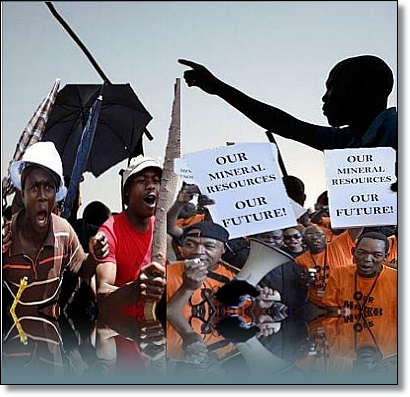South Africa: Mining Reforms Urgent

 |
| Miners on strike in South Africa |
We however cannot say with certainty that mining constitutes part of our future if the current government continues with a very weak and loose approach to Mining in South Africa.We cannot say mining is the future because it is currently the biggest contributor to environmental degradation, mining towns experience the highest levels of diseases, particularly TB and other occupational diseases… Minister of Health acknowledged that the 500 000 Mineworkers are the most vulnerable group to TB after prisoners.
Mining is supposed to be the biggest contributor to the State revenue and amount of money collected as taxes. However, mining as a whole contributes less than R25 billion to the revenue of South Africa, meaning that the whole mining taxes cannot finance just the education budget of one province, such as KwaZulu Natal whose budget for the current financial year is at R38 billion.
There is a wide spread instances of transfer pricing and base erosion in South Africa’s Mines and mining and no one seem to be doing anything about it. Mineworkers in all sectors continue to be paid slave wages, and live under inhuman conditions. This happens even after the adoption of a Mining Charter whose targets were supposed to be achieved by 2014.
It is 2014 this year, and none of the existing Mining companies can claim to have achieved the Mining Charter targets and objectives: It is 2014 this year, but the reality is: Mineworkers continue to live in squalor, despite a commitment in the Mining charter to improve their living conditions; Mining communities are not benefiting substantially from mining despite the mining charter’s commitment that there will be proper mine community development plans; Employment equity targets set for the Mining sector have not been met, and majority if not all Rock Drill Operatives continue to be black workers, while their bosses are white workers, most of whom are members of the Solidarity Union; Beneficiation and industrialisation of mineral resources is not happening in South Africa because mining companies impose import parity prices and are involved in efforts to undermine the commitment to industrial development.
Basically, all of the Mining Charter’s commitments and objectives have not been met, and instead of taking decisive action, the current government chooses to shift the goal posts to the year 2030. The question we should ask is: why does government pass laws and charters if it does not have the capacity to implement those laws?
What is to be done?
South Africa should move towards a decisive direction in terms of mineral resources and mining if indeed the ruling party is committed to radical socio-economic transformation. We should pass legislation in this parliament which says that a minimum of 50% of all minerals produced here in South Africa should be locally beneficiated and industrialised. The State owned mining company should be expanded to include mining of key and critical resources and make sure that all the minerals extracted by the state owned mining company are locally beneficiated and industrialised.
The department of minerals resources should put in place a commission on the remuneration and living conditions of mineworkers and come back to parliament to make legislative changes. The legislative changes should make it a law that all mineworkers should be built proper houses before they are employed. The legislative changes should include passing a law that say all Mineworkers should be paid a minimum of R12 500 per month after deductions. The department of minerals resources, working together with the national Treasury and SARS should put a place a forensic commission of enquiry to investigate transfer pricing and base erosion in the South African mining industry.
In the place of the Mining Charter, we should put in place the Freedom Charter to commemorate the life and times of Nelson Mandela who after his release from prison, said here in Cape Town that “nationalisation of mines is ANC policy, and any change to such a policy is inconceivable.” We hope that the current government will heed the call and take decisive step forward.
By Julius Sello Malema
The author is the leader of the Economic Freedom Fighters, a South African political movement,
